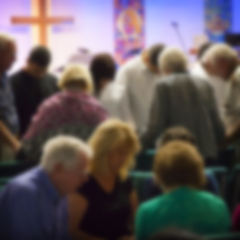 Phil was sitting at the piano with his back to the sparsely filled room. It was a Wednesday night prayer meeting in a traditional church. The crowd had quietly mumbled through a hymn or two and quickly transitioned into sharing prayer requests. Phil began to quietly play as the church members behind him shared the weight of their burdens, joys, sickness, and praise. They talked to God. They talked to each other about what God was doing. Phil could feel the connection point between the melodies he was playing and the eternal story his people were playing out just over his shoulder. Phil told me in that moment, he remembered how the scribes worked faithfully to record and transmit the story of God’s people. He remembered the work of the Psalmists painting song-pictures of the intersection between their personal story and God’s eternal story. He was feeling the songwriter’s call and he began a discipline of writing songs for his people; songs that tell their story, reflect their culture, and use their unique language.
Phil was sitting at the piano with his back to the sparsely filled room. It was a Wednesday night prayer meeting in a traditional church. The crowd had quietly mumbled through a hymn or two and quickly transitioned into sharing prayer requests. Phil began to quietly play as the church members behind him shared the weight of their burdens, joys, sickness, and praise. They talked to God. They talked to each other about what God was doing. Phil could feel the connection point between the melodies he was playing and the eternal story his people were playing out just over his shoulder. Phil told me in that moment, he remembered how the scribes worked faithfully to record and transmit the story of God’s people. He remembered the work of the Psalmists painting song-pictures of the intersection between their personal story and God’s eternal story. He was feeling the songwriter’s call and he began a discipline of writing songs for his people; songs that tell their story, reflect their culture, and use their unique language.
Phil’s story is one piece of a larger movement. Churches around the globe are re-discovering the value of indigenous content. To clarify, I’m defining indigenous content as songs that are written by the people in one local congregation or region FOR the worship life of that congregation or region. I’ve now worked with songwriting teams from the East coast to the West coast; large suburban churches, urban church-plants and traditional rural congregations. Over time, a congregation develops its own vocabulary—its own cultural ethos. Those linguistic nuances come from repeated phrases pastors use from the platform, vision statements, church slogans, and sermons. Different denominational tribes have their own lexicon as well that often drive language development in your church.
But just because your people share a few unique phrases, does that really mean you should be writing your own songs? There are currently over 25 million songs in the iTunes store. The company, CCLI, licenses the use of worship songs in churches. They currently have over 300,000 songs in their catalog. Do we really need more songs? Does your church really need songwriters?
The answer is yes. We need to write new songs in the church because it’s THOROUGHLY biblical. We see implicitly in the repeated command, “sing a new song to the Lord,” that the church NEEDS new songs to sing. We have ample biblical evidence of the songwriting process stirring among God’s people. There are over 30 song lyrics beyond the 150 Psalms in the Bible. (See Ex.15, Deut. 31-32, Num. 21, Jdg. 5, etc.). The psalms are a beautiful example of the connection between specific moments in the life of the songwriter (or the lives of God’s people) and the songs that were written in response. From Moses to Mary, Jubal to John, the Bible is full of songwriters and the songs they wrote. Writing new songs within the church is evidence that the living God continues to move among His people. A fresh movement of God’s Spirit draws fresh expressions of worship from us. Is God alive? Is the Spirit of God still at work? Is the cross still Good News? If the answer to any of those questions is yes, then new songs should be born in the church.
Practically speaking, songwriting within the church also kills the pop-culture dependence in us. It challenges the “idol factory” in our hearts. It is not the responsibility of a celebrity who doesn’t know our people to feed our people. God has chosen to use His servants in the local church to feed His people. Giving voice to the worship of God’s people around us is our responsibility as songwriters.
Inevitably, as you have read these posts, a number of barriers have popped up in your mind; reasons an indigenous songwriting movement cannot work in your setting. There are plenty of barriers, both real and perceived. In the next post we will wrestle with a few of these.
For the people quietly lifting up prayer requests behind Phil as he sat at the piano that Wednesday evening, it was worth the risk. For the people sitting to your right and left this Sunday, it will be worth the risk. Write with courage.

Super love the songs, just found you, you remind me of a Metro Station vibe. i love Metro Station. have me heookd, keep it up make more songs